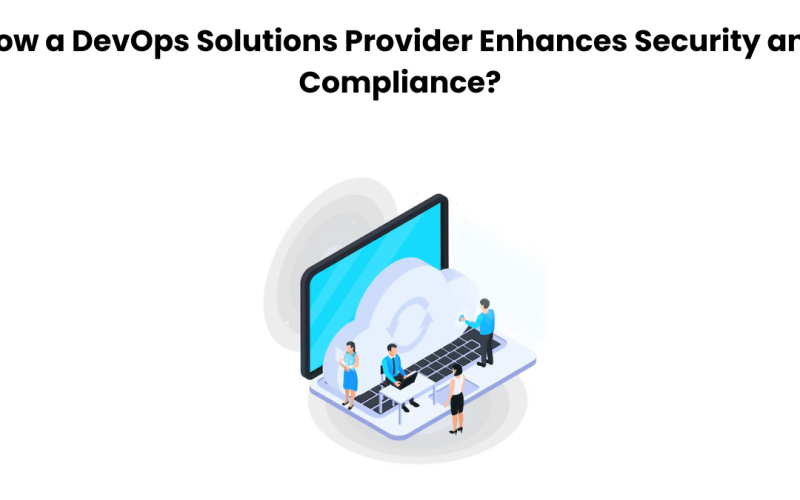In the modern business landscape, organizations are increasingly adopting digital technologies to stay competitive. However, with digital transformation comes a growing concern for security and compliance. As companies rapidly develop and deploy applications, ensuring that systems are secure and regulations are met becomes more challenging. This is where a DevOps solutions provider becomes essential. These experts help businesses build secure, compliant, and reliable systems from the ground up while maintaining the speed and flexibility DevOps is known for.
Understanding the Role of a DevOps Solutions Provider
A DevOps solutions provider is a company or a team of specialists that offers end-to-end DevOps services, including consulting, implementation, automation, monitoring, and ongoing support. Their job is to help businesses streamline software development and IT operations using best practices, tools, and frameworks.
When it comes to security and compliance, their role becomes even more critical. DevOps is all about speed, agility, and automation, which can sometimes make it easy to overlook security if it’s not properly integrated. A DevOps solutions provider ensures that security and compliance are not afterthoughts but are built into the software delivery pipeline from day one.
The Importance of Security and Compliance in DevOps
Security and compliance are no longer optional—they are fundamental. With increasing threats from cybercriminals, data breaches, and stricter regulations such as GDPR, HIPAA, and PCI-DSS, organizations can’t afford to leave gaps in their systems.
In traditional software development, security was something handled at the end of the process. But with DevOps, where code is deployed daily or even hourly, waiting until the end to address security is no longer feasible. Security must be embedded into every phase of development and deployment, and that’s where DevOps solutions providers make a big difference.
How a DevOps Solutions Provider Enhances Security
Integrating Security into the DevOps Lifecycle
One of the main advantages of working with a DevOps solutions provider is the integration of security practices across the entire DevOps lifecycle. This approach is commonly known as DevSecOps. By integrating security into development and operations, vulnerabilities are detected and addressed earlier in the cycle, which reduces risks and costs.
This involves using tools for code scanning, vulnerability assessment, and threat modeling at every stage—from code development to deployment and monitoring.
Implementing Automated Security Checks
Automation is at the heart of DevOps, and that extends to security. A DevOps solutions provider helps implement automated security checks, so every new piece of code or infrastructure change is scanned for known vulnerabilities before it goes live.
These checks can include static code analysis, dynamic application security testing (DAST), and container scanning. Automation not only speeds up the process but ensures consistent security without relying on manual reviews.
Managing Access Control and Identity
Another crucial part of security is managing who has access to what. DevOps solutions providers help businesses implement strong identity and access management (IAM) policies. This includes role-based access controls (RBAC), single sign-on (SSO), and multi-factor authentication (MFA).
By tightly controlling access to systems, environments, and data, businesses reduce the risk of insider threats or unauthorized changes to critical infrastructure.
Encrypting Data and Securing Communication
Data security is a top concern for every organization. DevOps providers help encrypt data at rest and in transit. They also configure secure communication protocols such as HTTPS, SSH, and VPNs to ensure sensitive data doesn’t fall into the wrong hands.
Automating encryption and secure key management across environments is another area where these providers add value.
Monitoring for Threats in Real Time
Security isn’t just about prevention—it’s also about detection and response. A DevOps solutions provider sets up continuous monitoring systems that alert teams in real time when unusual activity or potential threats are detected.
They integrate Security Information and Event Management (SIEM) tools and log management systems to gather, analyze, and act on security events, ensuring that any breaches or anomalies are addressed immediately.
How DevOps Solutions Providers Ensure Compliance
Automating Compliance Audits
Compliance requirements can be complex and time-consuming. A DevOps solutions provider helps automate many compliance checks by embedding them into the CI/CD pipeline. For example, code quality checks, access logs, audit trails, and configuration management can all be automated and documented.
This reduces the burden of manual audits and ensures that compliance is maintained continuously—not just during annual checkups.
Enforcing Policy as Code
Policy as Code (PaC) allows teams to define and enforce compliance policies programmatically. DevOps providers use tools that let organizations define rules for infrastructure usage, access, and configuration in code. These policies are automatically enforced during infrastructure provisioning.
For example, a policy might prevent any new server from being deployed without encrypted storage or block public-facing resources from being created.
Keeping Systems Up to Date
Regulatory frameworks often require systems to be updated with the latest patches and software versions. DevOps providers implement automated patching routines and configuration management tools to ensure that all systems remain compliant and secure.
They also maintain infrastructure as code templates that meet compliance requirements, so every new environment is automatically secure and auditable.
Generating Real-Time Compliance Reports
A major challenge during audits is gathering the necessary documentation and reports. DevOps providers integrate tools that automatically generate compliance reports based on real-time data, logs, and metrics. This makes it easy to demonstrate compliance to auditors or stakeholders at any time.
Benefits of Choosing a DevOps Solutions Provider for Security and Compliance
- Proactive Risk Management: Security is addressed at every stage, reducing the chance of breaches.
- Faster Remediation: Automated alerts and monitoring speed up threat response.
- Audit Readiness: With real-time reporting and automated audits, you’re always ready for compliance checks.
- Continuous Improvement: DevOps providers continuously update security practices to stay ahead of threats.
- Peace of Mind: Businesses can focus on innovation while security is handled professionally.
Real-World Example
Imagine a fintech startup developing an app that handles sensitive user data and financial transactions. They face strict regulatory requirements and need to release features quickly to stay ahead of competitors.
Partnering with a DevOps solutions provider, they implemented a secure CI/CD pipeline, automated code scanning, real-time monitoring, and encrypted databases. As a result, they passed compliance audits effortlessly, reduced their release cycle from weeks to days, and maintained a strong security posture.
This kind of transformation is not limited to large enterprises—businesses of all sizes can benefit from enhanced security and compliance through DevOps.
Conclusion
Security and compliance are essential elements of modern business operations, especially for organizations scaling quickly or handling sensitive data. DevOps solutions providers bring the expertise, tools, and processes needed to integrate these critical functions into your development and deployment pipelines. From automated code scanning and real-time monitoring to compliance reporting and access control, they ensure that your systems remain secure and compliant without slowing down innovation.
By partnering with the right provider, your organization can reduce risks, improve performance, and stay one step ahead of threats and regulations. When you work with an experienced on demand app development company that offers strong DevOps solutions, you can grow your business confidently, knowing that your security and compliance foundations are solid.
FAQs
What does a DevOps solutions provider do for security?
They implement secure coding practices, automate vulnerability scans, manage access controls, and set up monitoring tools to detect threats early.
Can DevOps help with compliance audits?
Yes, a DevOps solutions provider can automate compliance checks, generate real-time reports, and ensure continuous compliance across all environments.
What is DevSecOps and how is it different from DevOps?
DevSecOps integrates security directly into the DevOps process, ensuring that security is part of the development lifecycle rather than a separate step.
Do DevOps providers help with cloud security?
Absolutely. They help encrypt data, configure secure cloud architectures, manage identities, and implement security best practices specific to cloud platforms.
How do DevOps providers ensure access control?
They use tools and policies like role-based access control (RBAC), single sign-on (SSO), and multi-factor authentication (MFA) to limit and secure user access.












